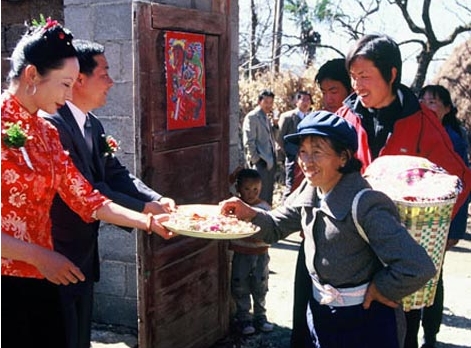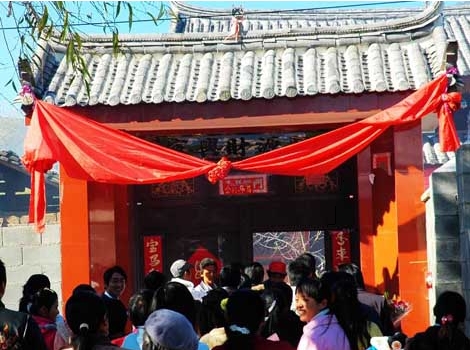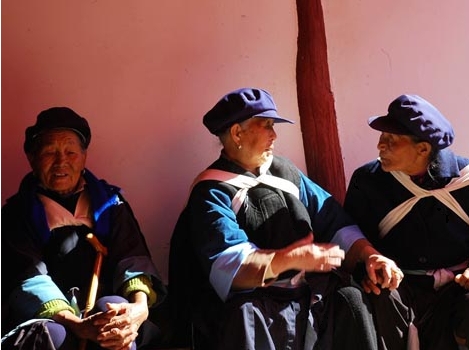


Besides "A Xiao" marriage, another kind of marriage, which exists around the Lugu Lake, is the formal marriage.
For a formal marriage the matchmaker introduces the man and the woman. The elder hosts the marriage and holds a formal wedding to invite relatives and friends. This kind of marriage is protected by social tradition. Only the parents admit and society recognizes that the couple can divorce.
The families, which have an only daughter or lack laborers, usually marry their daughter to a man, who should live in the woman's family. In this kind of marriage it is the woman who takes a fancy to the man. And her senior asks a third party to inquire about marriage. If the man's family agrees, they could tell the son. It is only possible, thought, with the man's mutual agreement. The woman's family will propose after the man's acceptance.
The matchmaker usually brings wine, tea, a pig's leg, and other items to the man's family as gifts. It is settled that the man's senior arranges the gifts to be sacrificed to the ancestors. They choose an auspicious day to hold the wedding. When they marry, the woman's family will send wine, meat and so on to the man's home to treat the guests. The man's family will prepare new clothes for the man.
On the morning of the wedding, several men sent by the woman's family go to welcome the man. And the man's siblings will accompany him to the woman's family. When he arrives at the woman's family, the wizard Daba will put ghee on the foreheads of the bride and bridegroom, wishing them longevity and happiness. The couple do obeisance and offer sacrifices to the heaven and earth, ancestors and senior generations and accept the wishes of the seniors. The woman's family will hold a banquet for the relatives and friends in the evening.
In the marriage, the man is not equal with the woman. He should change his family name to the woman's. Therefore, only a very poor guy would like to marry to a woman in this way. Some clever men could also replace their wives and become the householder in their wives' families.
Generally speaking, however, the formal marriage means that the man and woman get married and they live with the man's family. Firstly, the man's family sends a third party to the woman's with gifts like flax, silver, wine, tea and meat. If the woman's mother and uncles agree, they will eat some of the things and sacrifice the flax and silver to the ancestors. Later, they will invite some old people to share the wine, meat and so on sent by the man's family. This shows their engagement.
In three years after the engagement, the parents of the man and woman should consult with each other about the issue of betrothal money and choosing an auspicious day for the marriage. The amount of betrothal money depends on the two parties' conditions. If the man's family is rich and the woman's is pretty, it will be a lot of money. As to the common family, the man's family usually sends between 30 and 50 yuan (US $4.29 to 7.14), two pieces of flax, ten boxes of tea, two jars of wine. The rich families will send a horse, ox and other items. When the woman's family receives the gifts, they will tell to their relatives.
The wizard Daba will decide the date to welcome the bride. On the eve of the wedding day, the man's party should send the clothes, ear-rings and other gifts to the woman and her mother. Also the woman's uncles, brothers and sisters will receive clothes. In addition, the man's party sends wine, meat, rice and so on to treat the woman's guests during the wedding.
On the morning of the wedding day, the bridegroom goes to the bride's home under the company of his elder, the matchmaker and some young guys. There the welcoming group should distribute the wedding gifts to the bride's friends. Then they will help the bride up onto the horse. The bride's elder siblings will accompany her to the man's home. Her mother and uncles won't go with them. They show their sadness during the wedding.
Upon arriving at the man's village, an old mother with many children is asked by the man's family to welcome the bride, which symbolizes that the bride's future is like the old mother's–longevity with many children. There are also other people to welcome the bride.
When the bride reaches the man's home, the first ceremony is ancestor worship hosted by the wizard Daba, who will put ghee on the eyelids of the bride and bridegroom, as well as make wishes for the couple's longevity and good marriage. Then, the new couple shares a kidney of a sheep and drink to show they are faithful to each other and won't have another "A Xiao." Lastly, the couple knocks heads with their seniors, who will give gifts or money and bless the couple.
The wedding banquet usually has pig, sheep and ox to sacrifice to the ancestors. The rich even kills yak for the feast. It is commonly held in the courtyard of the man's family. During the banquet, both families and their guests will have a wine drinking competition. The bride won't stop persuading the guests to drink till they are drunk. In this way, it shows the hosts' hospitality.
The women, who are formally married, have a lower status compared with the ones who are in an "A Xiao" relationship. According to local customs, if the woman wants a divorce, she must pay compensation for the wedding and gifts. If it is the man who wants a divorce, it is not necessary to return the gifts. Therefore, most the women are able to realize the problem with divorce. However, if only the woman wanting a divorce is able to return the gifts, she could leave the man's family at any time. Those poor women, who want a divorce but have little money, have to escape from marriage to realize her dream of having an "A Xiao." The public don't oppugn the women, who escape from the marriage, but sympathize with them.
For a formal marriage the matchmaker introduces the man and the woman. The elder hosts the marriage and holds a formal wedding to invite relatives and friends. This kind of marriage is protected by social tradition. Only the parents admit and society recognizes that the couple can divorce.
The families, which have an only daughter or lack laborers, usually marry their daughter to a man, who should live in the woman's family. In this kind of marriage it is the woman who takes a fancy to the man. And her senior asks a third party to inquire about marriage. If the man's family agrees, they could tell the son. It is only possible, thought, with the man's mutual agreement. The woman's family will propose after the man's acceptance.
The matchmaker usually brings wine, tea, a pig's leg, and other items to the man's family as gifts. It is settled that the man's senior arranges the gifts to be sacrificed to the ancestors. They choose an auspicious day to hold the wedding. When they marry, the woman's family will send wine, meat and so on to the man's home to treat the guests. The man's family will prepare new clothes for the man.
On the morning of the wedding, several men sent by the woman's family go to welcome the man. And the man's siblings will accompany him to the woman's family. When he arrives at the woman's family, the wizard Daba will put ghee on the foreheads of the bride and bridegroom, wishing them longevity and happiness. The couple do obeisance and offer sacrifices to the heaven and earth, ancestors and senior generations and accept the wishes of the seniors. The woman's family will hold a banquet for the relatives and friends in the evening.
In the marriage, the man is not equal with the woman. He should change his family name to the woman's. Therefore, only a very poor guy would like to marry to a woman in this way. Some clever men could also replace their wives and become the householder in their wives' families.
Generally speaking, however, the formal marriage means that the man and woman get married and they live with the man's family. Firstly, the man's family sends a third party to the woman's with gifts like flax, silver, wine, tea and meat. If the woman's mother and uncles agree, they will eat some of the things and sacrifice the flax and silver to the ancestors. Later, they will invite some old people to share the wine, meat and so on sent by the man's family. This shows their engagement.
In three years after the engagement, the parents of the man and woman should consult with each other about the issue of betrothal money and choosing an auspicious day for the marriage. The amount of betrothal money depends on the two parties' conditions. If the man's family is rich and the woman's is pretty, it will be a lot of money. As to the common family, the man's family usually sends between 30 and 50 yuan (US $4.29 to 7.14), two pieces of flax, ten boxes of tea, two jars of wine. The rich families will send a horse, ox and other items. When the woman's family receives the gifts, they will tell to their relatives.
The wizard Daba will decide the date to welcome the bride. On the eve of the wedding day, the man's party should send the clothes, ear-rings and other gifts to the woman and her mother. Also the woman's uncles, brothers and sisters will receive clothes. In addition, the man's party sends wine, meat, rice and so on to treat the woman's guests during the wedding.
On the morning of the wedding day, the bridegroom goes to the bride's home under the company of his elder, the matchmaker and some young guys. There the welcoming group should distribute the wedding gifts to the bride's friends. Then they will help the bride up onto the horse. The bride's elder siblings will accompany her to the man's home. Her mother and uncles won't go with them. They show their sadness during the wedding.
Upon arriving at the man's village, an old mother with many children is asked by the man's family to welcome the bride, which symbolizes that the bride's future is like the old mother's–longevity with many children. There are also other people to welcome the bride.
When the bride reaches the man's home, the first ceremony is ancestor worship hosted by the wizard Daba, who will put ghee on the eyelids of the bride and bridegroom, as well as make wishes for the couple's longevity and good marriage. Then, the new couple shares a kidney of a sheep and drink to show they are faithful to each other and won't have another "A Xiao." Lastly, the couple knocks heads with their seniors, who will give gifts or money and bless the couple.
The wedding banquet usually has pig, sheep and ox to sacrifice to the ancestors. The rich even kills yak for the feast. It is commonly held in the courtyard of the man's family. During the banquet, both families and their guests will have a wine drinking competition. The bride won't stop persuading the guests to drink till they are drunk. In this way, it shows the hosts' hospitality.
The women, who are formally married, have a lower status compared with the ones who are in an "A Xiao" relationship. According to local customs, if the woman wants a divorce, she must pay compensation for the wedding and gifts. If it is the man who wants a divorce, it is not necessary to return the gifts. Therefore, most the women are able to realize the problem with divorce. However, if only the woman wanting a divorce is able to return the gifts, she could leave the man's family at any time. Those poor women, who want a divorce but have little money, have to escape from marriage to realize her dream of having an "A Xiao." The public don't oppugn the women, who escape from the marriage, but sympathize with them.
Source:
http://traditions.cultural-china.com/en/115Traditions4125.html





